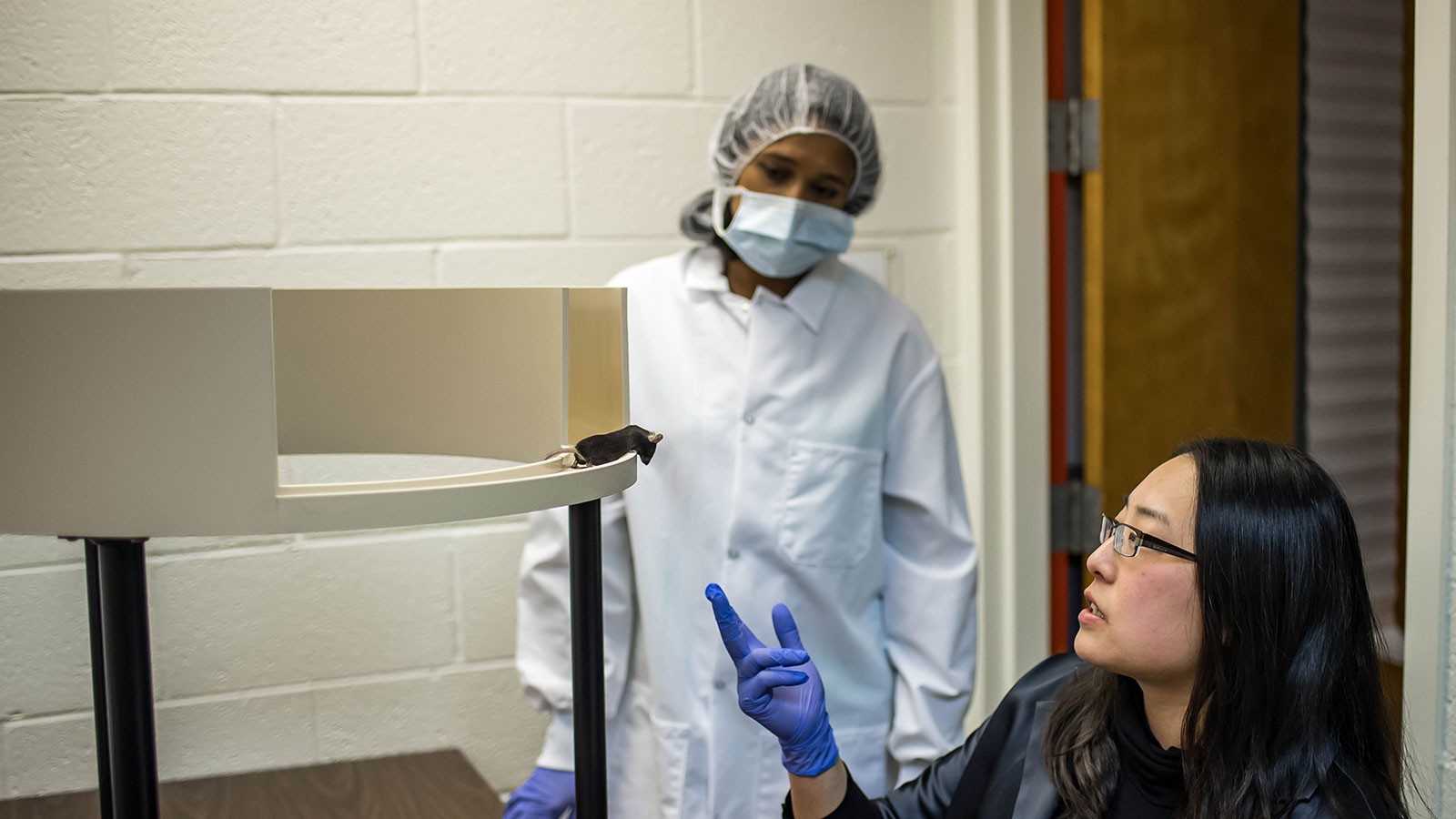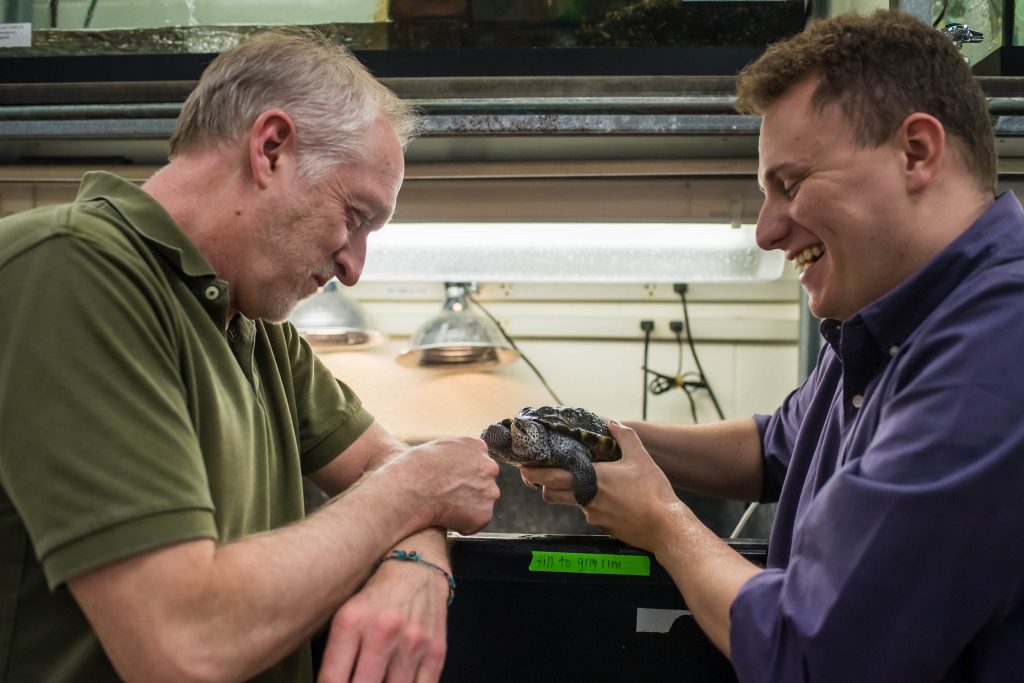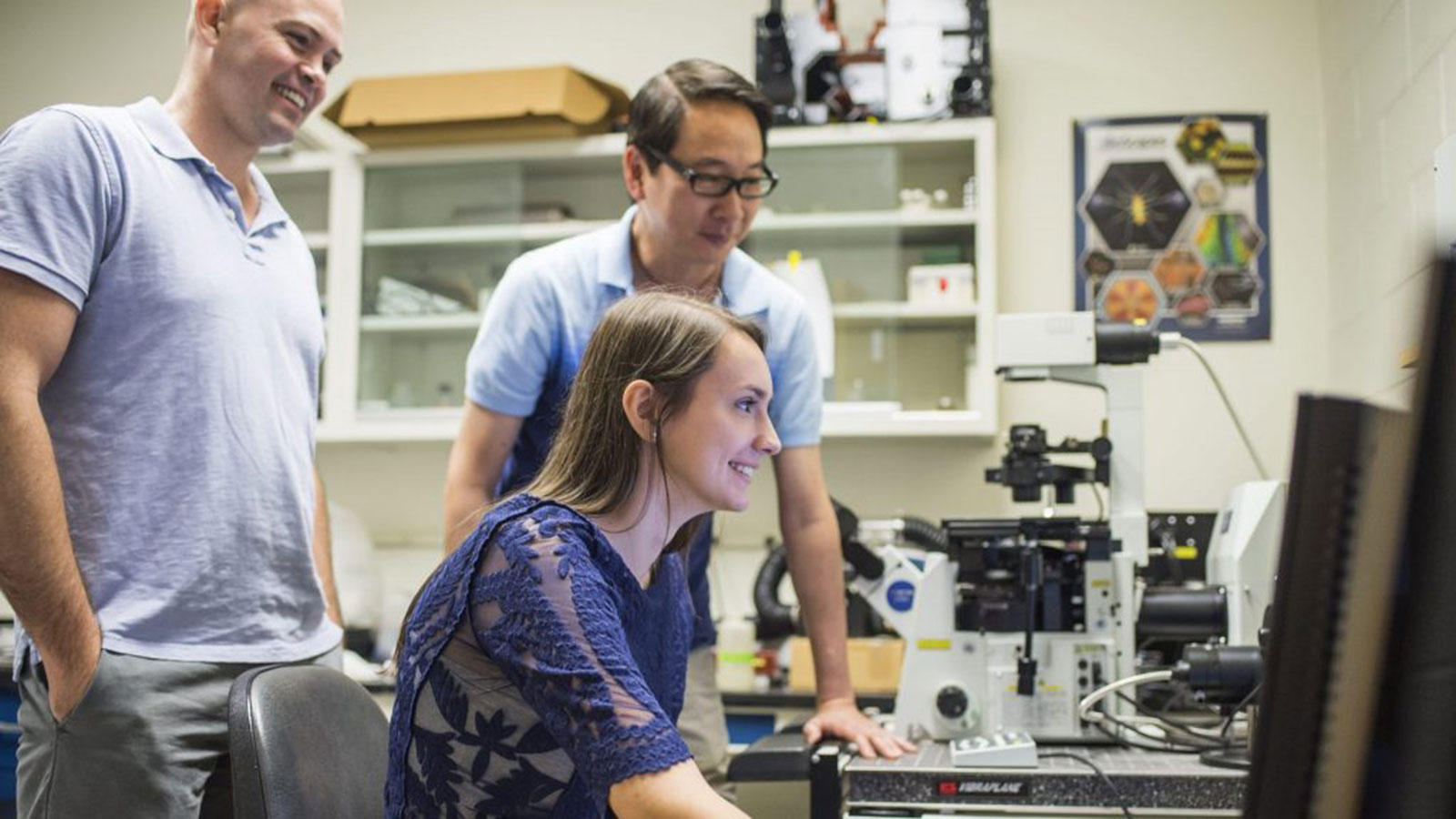Student Research Opportunities
Biology Research at Saint Joseph's

Independent research by students is one of the key features of the educational philosophy of the biology department. By learning how to ask and answer questions, design and perform experiments, analyze data and draw appropriate conclusions, students learn not only factual information but develop the reasoning skills needed to actually “do” science.
Participating in research helps students develop and hone their logical skills and the critical thinking ability that is so bandied about in education today. Learning how to ask and answer scientific questions, work with others, draw conclusions and present findings in both the spoken and written word prepares students for any potential career. Whether done for academic credit, pay or as a volunteer, research is an excellent opportunity for students.
The biology faculty are committed to providing opportunities to engage in research to all interested students. The benefits to the student, both in terms of logical skills and the development of a deeper understanding of scientific principles in general, make research a great experience for all students, even those who are not contemplating a career involving research.
How to Participate in Biology Research

Students can participate in research in three ways:
- For academic course credit
- For pay (during the summer)
- As volunteers
Regardless of how a student participates, the process of identifying a faculty mentor is the same.
- Look at the research descriptions of the various biology faculty who take undergraduate students into their labs.
- Make an appointment to speak with faculty members you would like to work with to find out what projects are currently going on in their labs and if space is available.
- Talk to some of the students currently doing research projects in the different labs to get their perspectives.
- Once a faculty member has agreed to take you on, make the necessary arrangements to work with them such as registering for research as a course.
Academic Year Research

Undergraduate students can engage in biology research during their academic year for credit or as volunteers.
BIO 493 and BIO 494: Junior and senior biology majors can register for BIO 493 and 494 after obtaining permission from their prospective faculty mentor.
- One semester of research may count as an upper-level biology elective while subsequent semesters count as free electives.
- Students taking research for course credit are expected to put in at least nine hours per week on their projects.
- All students who take BIO 493 and/or BIO 494 are required to present their research results in poster form at the last Wednesday seminar in the spring semester.
Honors Research: Students with a 3.5 GPA or higher in their major can take Honors Research with the permission of their faculty mentor. This is open to students regardless of whether they're in the Honors program.
- Two semesters of approved Honors Research may count as upper-level biology electives and honors distribution course.
- Students in Honors Research are expected to put in at least 12 hours per week on their project and present their results in the form of a seminar during the spring semester of their senior year.
- All students who complete two semesters of Honors Research, give a public seminar and satisfy all to her requirements will receive Departmental Honors at graduation.
If students decide to engage in research as a volunteer, they will need permission from their faculty mentor. There is no minimum number of hours expected per week, and volunteers do not have to present their work in the spring, although they are encouraged to do so.
Faculty Research Areas
Scholarly research is a major focus of the Department of Biology's faculty members. Students who are interested in participating in research can view each faculty member's area of expertise and research interests below or download our student research brochure.
Undergraduate and graduate students give a short explanation of the research they are doing in different faculty research's lab.
-
Education: PhD in Environmental Engineering, University of Massachusetts
Expertise: Catabolite repression in bacteria, environmental microbiology
Dr. Arango’s research focuses on Sinorhizobium meliloti, an agriculturally beneficial bacterium. S. meliloti can live in the soil as a free living organism, or in symbiosis with legumes, such as alfalfa, which makes it an interesting research model. Her research centers on elucidating the mechanism by which genes involved in diverse processes are controlled by catabolite repression. Through studying the regulation of genes for raffinose and lactose utilization, she and her students aim to understand the role of the phosphotransferase system in catabolite repression. The Arango lab also does research in sustainable and affordable water treatment methods for households that do not have access to a clean water supply
-
Education: PhD in Biology, University of California, Davis
Expertise: Bioinformatics and evolutionary biology
Dr. Braverman’s main areas of research are: population genetics, molecular evolution, and bioinformatics. His goal is to characterize and explain genetic variation observed within natural populations and among species. Using empirical (field collection and laboratory), computer modeling and DNA sequencing, he and his students test models of natural selection and their alternatives. In addition, he studies rates and patterns of molecular divergence to test the molecular clock and identify the processes responsible, and designs software to answer evolutionary questions about large genomic datasets. His study of organisms range from fruit flies to tropical trees.
-
Education: PhD in Microbiology & Molecular Genetics, Emory University
Expertise: Understanding the molecular mechanisms of bacterial pathogenesis
Dr. Bhatt’s research focuses on the regulation of gene expression in bacterial pathogens. Specifically, he is interested in understanding how the RNA-binding protein Hfq and its accompanying regulatory small RNAs control a disease-causing locus called the LEE in enteropathogenic E. coli (EPEC). Recently, Dr. Bhatt has initiated similar studies in the related but undercharacterized pathogen Escherichia albertii by optimizing a genetic approach to mutagenize the bacterial genome. Future studies are directed at observing the consequences of such mutations on gene expression from the LEE. In Dr. Bhatt’s lab, students take a transdisciplinary approach by integrating techniques and tools from genetics, biochemistry, microbiology, and chemistry to understand the molecular basis of disease.
-
Education: PhD in Biology, University of California, Los Angeles
Expertise: Stream ecology and the biomechanics of larval dispersal
Dr. Fingerut researches how the movement of water shapes the behavior, morphology and distribution of organisms living in aquatic ecosystems by drawing on theory and techniques from physics, engineering and ecology. Through a combination of field research and careful manipulation of flow in the laboratory, his lab is able to identify the physical and behavioral mechanisms that control population distributions at scales ranging from mm’s to 100’s of meters.
-
Education: PhD in Biological Sciences, University of Maryland Baltimore County
Expertise: Cell and organelle motility; actin dynamics
Dr. King Smith’s research interests center on understanding mechanisms of intracellular organelle transport in eukaryotic cells. As a model system, her lab uses retinal pigment epithelial (RPE) cells from the eyes of fish. Fish RPE cells contain numerous melanin pigment granules (melanosomes) that undergo mass migration in response to light. RPE cells can be isolated and cultured in vitro, allowing the study of the cytoskeletal mechanisms that mediate melanosome motility.
-
Education: PhD in Immunology, University of Pennsylvania
Expertise: Telomere maintenance by RNA-processing proteins
Dr. Lee-Soety is investigating mechanisms by which telomeres are maintained using baker’s yeast as the model organism. Telomeres cap the ends of eukaryotic chromosomes and protect essential genomic information. If telomeres are not properly maintained, the cell may perceive the ends as damaged DNA and activate DNA damage signals which lead to cell cycle arrest, also known as cell senescence. Her lab is interested in understanding how an RNA processing protein, Npl3, is involved in this maintenance. Mutant yeast cells that can no longer maintain telomeres and lack Npl3 function undergo rapid cell senescence and produce high levels of unusual non-coding telomere transcripts. We have evidence to show that Npl3 may regulate the expression of these transcripts and want to understand the mechanism and significance of this regulation.
-
Education: Ph.D. in Chemical Engineering, University of Rhode Island
Expertise: Membrane structure and assembly, protein-protein assembly
Dr. Li’s research area focuses on understanding the physical and chemical principles governing the interaction of membrane proteins. Of particular interest is the interaction of fibroblast growth factor receptors and mucin proteins. Understanding these interactions is important because many cellular processes are regulated by them. Furthermore, diseases may arise when these interactions are not controlled properly due to mutations or overexpression of the membrane protein. Thus, these studies may provide useful information towards the development of better therapeutics.
-
Education: PhD in Genetics, Temple University
Expertise: Animal behavior, ecology and evolution in exotic and endangered species
Dr. McRobert’s research is directed at understanding the genetic, ecological, and evolutionary foundations of animal behavior. Animals utilized in his work include insects, fish, amphibians, and reptiles. These animals are housed in the biodioversity laboratories, which serve as home to hundreds of different species. Some of the work utilizes ‘model species’ such as Drosophila, and some of the work focuses on species that are listed as threatened or endangered. As part of their conservation research the laboratories hold assurance colonies of turtles that are on the brink of extinction.
-
Education: PhD in Biology, New York University
Expertise: Physiology, Behavioral Genetics and Neurobiology
Dr. Nelson’s research is focused on understanding the cellular and molecular nature of complex behaviors, such as sleep. To accomplish this, his lab studies the model organism Caenorhabditis elegans, a microscopic roundworm, whose sleep behaviors are controlled by similar genes and neurochemistry underlying human sleep. C. elegans is easily maintained in the lab and genetically tractable, making this a powerful system for identifying new pathways in regulating sleep and other behaviors. His lab uses a combination of techniques common in the following disciplines: molecular biology, genetics and animal behavior.
-
Education: PhD in Physiology & Neuroscience, New York University
Expertise: Learning and memory, neurodegenerative and neurodevelopmental disorders, sleep, and translational control
Dr. Tudor’s research focuses on elucidating the molecular and cellular mechanisms underlying learning and memory. Using mouse models of various neurodegenerative and neurodevelopmental disorders, the Tudor lab examines the role of molecular signaling pathways on behavior. The lab also studies the impact of sleep on memory storage and protein synthesis in the brain. Members of the Tudor lab become experienced in molecular genetics, protein biochemistry, murine aseptic surgery, and behavior assessment.
-
Education: PhD in Plant Pathology, University of Georgia
Expertise: Fungal pathogens of plants, microscopy
Dr. Snetselaar’s recent work revolves around the fungus Ustilago maydis, which causes smut disease of corn plants. She is currently undertaking an ecological study to determine how the fungal spores survive in the soil. In addition, her students are using microscopic techniques to study the host-pathogen interface the fungus establishes with the corn plant. Finally, her lab has isolated dozens of U. maydis mutants with developmental defects that prevent them from infecting plants. She and her students are using molecular, genetic and microscopic methods to analyze these mutants to learn more about this disease-causing fungus.
-
Education: PhD in Plant Physiology, West Virginia University
Expertise: Global climate change and plant physiology
Dr. Springer’s lab focuses on plant physiological ecology and plant responses to global changes in climate and atmospheric carbon dioxide. His research examines plant responses to changes in [CO2 ] and other global change phenomena such as global temperature and water availability. He and his students are especially interested in the response of plant traits that are relevant to plant evolution such as flowering time and reproduction. A major area of this research is aimed at elucidating the molecular mechanisms that account for these elevated [CO2]-induced changes in flowering time using techniques based on traditional plant physiology, molecular genetics and functional genomics.
Student Research Opportunities
Saint Joseph's offers numerous opportunities for students to get involved in research. Through grants and programs, student researchers are able to gain valuable experience in laboratory techniques, research conduct and analysis; collaborate with faculty and classmates in class, in the lab and in the field; and work with commonly used instrumentation and techniques. Research experience helps students develop the skill set of a working scientist while still within the University's nurturing environment and is ideal preparation for them to continue their education in master's and doctoral programs. Biology research opportunities for students at Saint Joseph's include:
- Summer Scholars Program
- McNulty Scholars Program
- Undergraduate Summer Research Grants
- Melvin Firman Research Grant
- Evelyn F. C. Ma Research Grant
- Arno Viehover Undergraduate Tuition Scholarship
- The Martin & Karen Gibbs Undergraduate Summer Biology and Chemistry & Biochemistry Joint Research Grant
If you have any questions about these opportunities, please contact us.
Student Research Outcomes
Over the last few years, students have been published in journals and websites including:
- Applied and Environmental Microbiology
- Behaviour, Biochemical and Biophysical Research Communications
- Geodiversitas
- Journal of Bacteriology
- Journal of Microbiology & Biology Education
- Journal of Neuroscience
- Journal of Parasitology
- Journal of Zoology
- Paleontologicheskiy Zhurnal
- The Physics Teacher
- Visual Neuroscience
- PLoS One
- Behavioural Processes
- Entomological News
- CBE Life Science Education
- eLife
- Freshwater Science
- Integrative Zoology
In the last five years, student research has been presented at:
- American Society for Cell Biology
- American Society for Microbiology
- Biophysical Society
- American Physiological Society
- Annual Drosophila Research Conference
- Experimental Biology
- Ecological Society of America
- Freshwater Biology
- North American Black Fly Association
- North Eastern Microbiologists: Physiology, Ecology and Taxonomy
- Obruchev Symposium
- Society for Integrative and Comparative Biology
- Society of Nematology